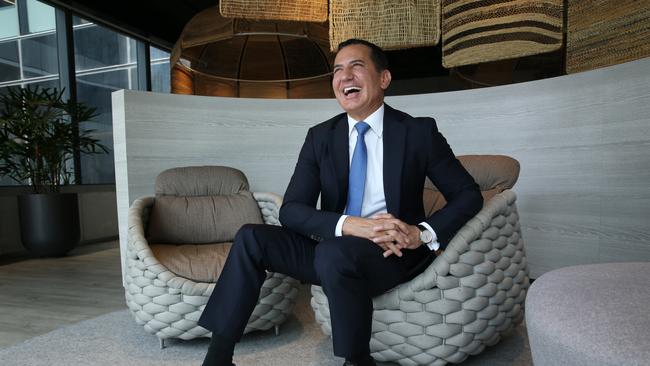Commission convert George Frazis has rosy view of future
George Frazis, who will part ways with Westpac around July after 10 years at the bank, has, like many others, changed his tune.

Like scores of his peers, outgoing Westpac consumer boss George Frazis didn’t see the need for a banking royal commission, even though he had watched banks in Britain endure the fallout from painful conduct issues early this decade.
Frazis, who will part ways with Westpac around July after 10 years at the bank, has, like many others, changed his tune.
“Particularly if you look at the stories highlighted in the royal commission, they were just awful. They really impacted those people’s lives,” he says, noting action and not words is required to fix the industry’s failings.
“From my perspective this is all about action now, not about telling people what we are doing,” Frazis says. “There is no silver bullet on this — it’s just change after change.
“For me technology is becoming a more critical element of what is required.”
Frazis leaves Westpac after a sweeping restructure this week subsumed the wealth division into the consumer and business banking units, and he is planning to throw his hat in the ring for chief executive and leadership roles in Australia and offshore.
In the restructure, Westpac will sell some of its financial planners and exit the industry.
Wealth boss Brad Cooper will also exit.
Frazis shies away from commenting on whether he is interested in the top jobs at Bank of Queensland or National Australia Bank, where searches are occurring, but he has his sights on a CEO role as his next gig.
“My aspirations are to take on a leadership role either in banking or outside of banking, whether in Australia or somewhere internationally,” he says. “There are a number of opportunities that are potentially emerging, so after the transition, I’ll have time to really reflect and consider those.”
Frazis’s career has traversed several industries. He started as an air force engineer, leading the migration to F/A-18 fighter aircraft when they were introduced. From there he moved into consulting and then banking and has worked for three of the major four lenders in senior and executive roles.
“I really enjoy banking and I have a whole lot of capability there, so my priority would probably be banking, but the other thing I really enjoy is things related to the consumer,” Frazis says of his next move.
His career has included stints leading National Australia Bank’s business bank, Westpac New Zealand, St George, and Westpac’s entire stable of consumer businesses and brands for the past four years.
A fund manager who declined to be named labelled Frazis a “seasoned and experienced banker” but believes he would have been overlooked in coming years as Westpac CEO succession plans for Brian Hartzer gained traction.
The banking industry is in a state of flux as the royal commission recommendations loom large and the big players continue to tally remediation costs.
Westpac did not escape the ire of commissioner Kenneth Hayne, including for charging customers advice fees where services weren’t provided and in the consumer bank for issues on the witnessing of documents and allowing staff to fill out home loan forms for customers.
Westpac came out of the royal commission alongside ANZ Bank on a better footing than rivals National Australia Bank and Commonwealth Bank, which took a battering.
Frazis says Westpac tried to get ahead of the curve after watching British banks get hit by consequences for a scathing mis-selling scandal related to payment protection insurance.
He says: “We could see what was happening in the UK in terms of conduct risk and non-financial risk and we were trying to say ‘what were the learnings out of the UK that we can start applying here?’.”
In the consumer bank, that involved measures including a review of Westpac’s 120 products, closer case management of longstanding complaints and the introduction of a service promise based on the principles of the Ritz-Carlton, which tech giant Apple also benchmarked itself against when setting up its stores.
Westpac’s consumer division didn’t fare well in Westpac’s results for the year ended September 30 as margin pressure, funding costs and increased expenses from repaying customers kept cash earnings flat.
The unit did attract 250,000 new customers and higher levels of deposits.
The post-royal commission journey presents a long road ahead for all of the major banks and Westpac’s job across its wealth and consumer units to remediate customers is far from over.
“We’ve added a lot of resources and really improved our process so I am pretty confident from a consumer bank perspective we’ve got the bulk of the big issues dealt with,” Frazis says.
“It is ongoing and you can never be complacent.”
Automating processes to reduce the risk of errors and remuneration of staff have also been a high priority for Frazis.
Early this month Westpac removed pay incentives for bank tellers and increased their base salaries, to remove conflicts of interest.
Despite not staying on at Westpac for the next phase, Frazis is optimistic on how the industry will navigate a slowing housing market and the royal commission wash up.
“I’m really confident in five years’ time what we’ll be able to say as an industry is that we have a really strong banking system, that supports the economic growth of the nation and the prosperity of individuals and absolutely does the right thing by individuals,” he says.




To join the conversation, please log in. Don't have an account? Register
Join the conversation, you are commenting as Logout